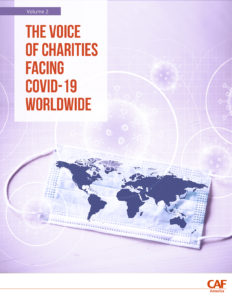Charities across the globe are feeling the impact of COVID-19, from reduced contributions, canceled events, broken supply chains, and an inability to meet the expectations of the populations they serve. But even despite these setbacks, organisations are proving not only how necessary their services are as they serve needs during the pandemic, but their resilience and donors have the opportunity to support these charities and become a part of their success story. Our organisation, CAF America (Charities Aid Foundation of America) is conducting monthly surveys of our charity partners worldwide to gauge how each is dealing with the crisis, detect trends across the industry, and determine how together with our donors and partners we can save our sector.

CAF America polled 880 organisations worldwide to learn how the coronavirus global pandemic continues to impact their work
Never before has humanity faced a global pandemic in which philanthropy has played such an important role. More than 53 per cent of 880 charities that responded to our most recent survey (May 2020) provide direct services to those affected by the pandemic including frontline relief services such as healthcare and essential services such as shelter, food, and nursing homes.
First, the troubling news: nearly 95 per cent of charitable organisations have been negatively impacted by COVID-19, and there is a growing concern that some may not continue to operate if funding doesn’t increase (15 per cent of organisations surveyed have already closed their doors, up from 10 per cent in March); 17 per cent did not receive funding in the past month at all, and those that did saw smaller grants or had challenges connecting with donors. One such organisation experienced a revenue fall of 80 per cent with no finances to maintain employment or pay for expenses. Nearly 30 per cent have had to furlough or lay off employees.
Many organisations shared concerns about the long-term impact of the pandemic on their donors’ ability to continue their support while the need for services is expected to increase, as more lives will be impacted by the economic hardships exacerbated by the coronavirus pandemic. One organisation that provides legal aid in Southeast Asia notes that an imposed curfew has resulted in the criminalization of homelessness, and they are working to challenge the enforcement of the Emergency Decree. Hunger is also a growing concern, as is the fear of the double impact of hurricane season when resources are already stretched thin. We’re finding that COVID-19 is not just the next disaster – we have to rewrite the book on philanthropy entirely if these organisations expect to fulfill their missions and survive.
There is some good news, however: 60 per cent of charities have pivoted by launching new fundraising campaigns and reducing operational costs. Some organisations are lucky to have healthy financial reserves, but note the need to have new funding come in. Those that have managed to maintain operations so far have shown transparent leadership, effective partnerships, and continued funding as the leading factors that will see them through this time. From the time of the first survey in March, the number of those experiencing staffing disruptions due to illness or remote work was reduced almost 50 per cent. Donors have yet another opportunity to help organisations integrate current technology infrastructure that is necessary for virtual work, but often adds a new expense to already strapped budgets.
Some positive donor initiatives include unrestricting funding, or donors more open to extending support beyond an original project and covering core operational expenses, relaxing reporting deadlines and requirements, and giving earlier than planned, as many donors are expediting funding to current projects. Though it may be more difficult to execute and unrestricted funding is not always possible, the shift to more flexible giving is paramount to the survival of many organisations.
Donors have the great opportunity to bring light to this dark situation for many charitable organisations. After all, if our sector does not survive the pandemic, who will help the helpless?
Ted Hart is President & CEO of CAF America






Comments (0)